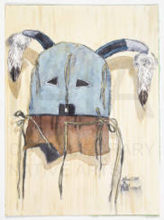Article
Generally speaking, in most indigenous traditions, including the Pueblo and Navajo cultures, when a dancer dons a mask for a specific ceremony, that dancer becomes the god represented by the mask, just as the mask becomes animated by the god as it is worn. The boy or man who prepares to wear a mask for a specific ritual actually becomes, or personates, the god whose semblance is captured by the mask. During the ceremony, the wearer does not impersonate or merely act like the god, but rather, he is the god.
Masks are sacred objects that facilitate communication and connection between man and gods. Even when not worn during ceremonial dances, masks are revered objects that are fed and taken care of, for example by Pueblo kiva societies or clans, who are responsible for the masks' well-being as if, and because, they are vital, dynamic, and sentient things.Masks are sacred objects that facilitate communication and connection between man and gods. Even when not worn during ceremonial dances, masks are revered objects that are fed and taken care of, for example by Pueblo kiva societies or clans, who are responsible for the masks' well being as if, and because, they are vital, dynamic, and sentient things.
"Untitled (Navajo Blue Mask)," watercolor on paper, 1964, by Alfred Clah. (N-1226) Gift of Charles Dialey, 2013. Courtesy of the Museum of Contemporary Native Arts, Santa Fe, NM. All Rights Reserved, Use with permission only.
Manuscripts
A04 Dance Hall of the Dead (04-06) p. 12
A04 Dance Hall of the Dead (04-06) p. 13
A04 Dance Hall of the Dead (04-06) p. 22
A04 Dance Hall of the Dead (04-06) p. 82
A04 Dance Hall of the Dead (04-06) p. 83
A04 Dance Hall of the Dead (04-06) p. 84
A04 Dance Hall of the Dead (04-06) p. 103
A04 Dance Hall of the Dead (04-06) p. 104
A04 Dance Hall of the Dead (04-06) p. 109
A04 Dance Hall of the Dead (04-06) p. 112
A04 Dance Hall of the Dead (04-06) p. 118
A04 Dance Hall of the Dead (04-06) p. 124
A04 Dance Hall of the Dead (04-06) p. 125
References
Bunzel, Ruth Leah
1932 Zuni Katchinas: An Analytical Study. 47th Annual Report of the Bureau of Amerian
Ethnology: 837-903.
Kluckhohn, Clyde, W. W. Hill, and Lucy Wales Kluckhohn
1971 Navajo Material Culture. Cambridge: Belknap Press of Harvard University Press.
Schwarz, Maureen Trudelle
1997 Molded in the Image of Changing Woman. Tucson: University of Arizona Press.
Stevenson, Matilda Coxe
1898 Zuni Ancestral Gods and Masks. American Anthropologist, 11 (2) (Feb., 1898): 33-40.
Tozzer, Alfred M.
1900 Notes on Religious Ceremonials of the Navaho. New York: G.E. Stechert.

